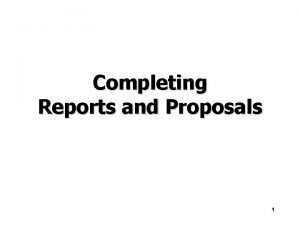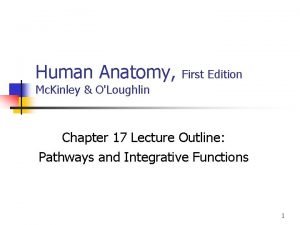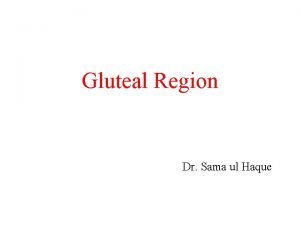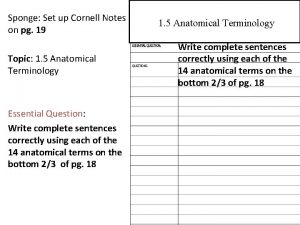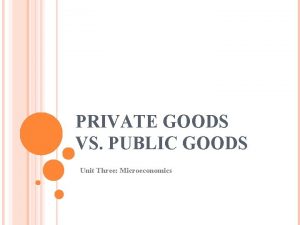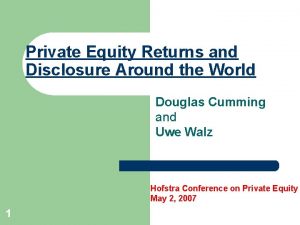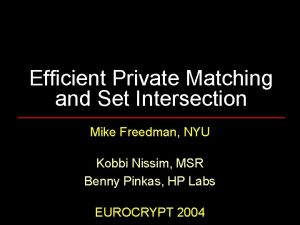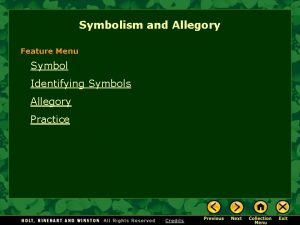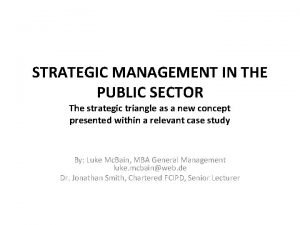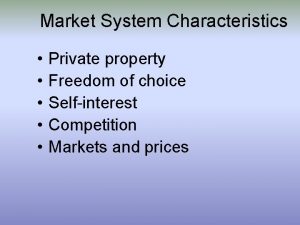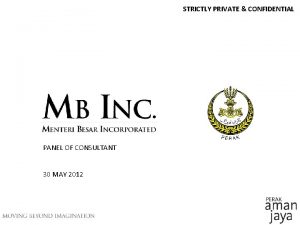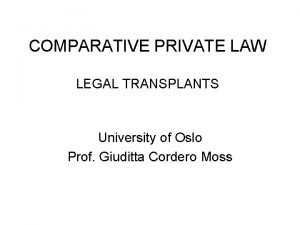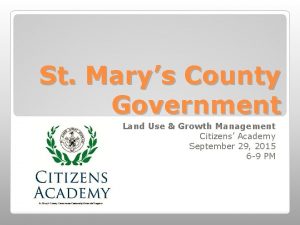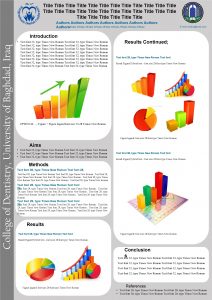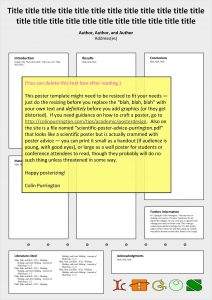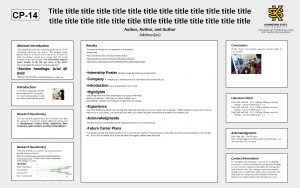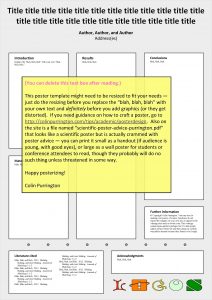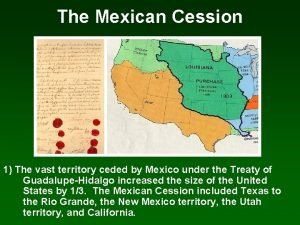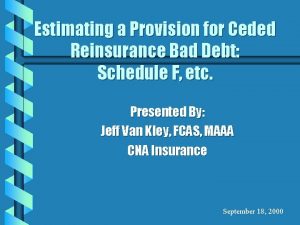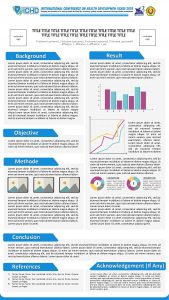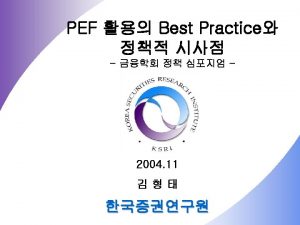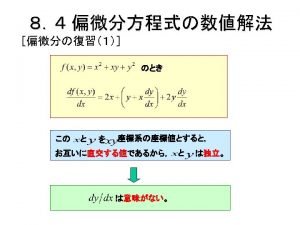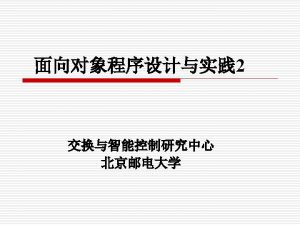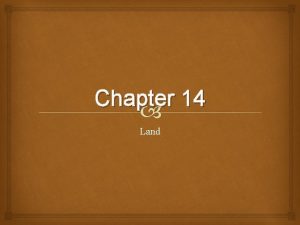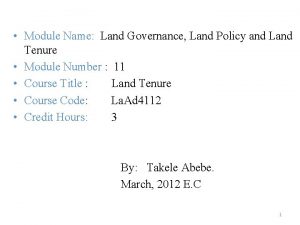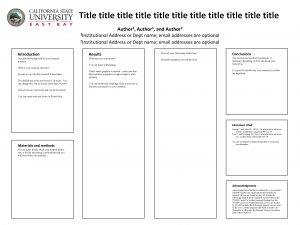Superior Title to Private Land Relinquished Ceded and






















![The 1880 -81 [3 rd Session of the 46 th Congress] serial set � The 1880 -81 [3 rd Session of the 46 th Congress] serial set �](https://slidetodoc.com/presentation_image/032ee4771cae9963905fcad4f4f12531/image-23.jpg)































- Slides: 54

Superior Title to Private Land: Relinquished, Ceded and Severed from the Public Lands of Texas, without Reservation or Restriction The Question: A Contract with continuing obligations, cannot be altered by either party, Grantor, or Grantee…. . After Execution… OR, Can it?

Land Patents: What are they good for? �For what purpose, and for whose benefit were these patents granted? Cui bono- latin for whose benefit? This PP presentation is to provide evidence that there IS a immeasurable value in retaining and claiming the “forever” benefit of the original patent contract, granted to the patentee, under the laws in force and effect when the land grant / land patent was executed. �The Assignee must accept the responsibility to perform due diligence, and do a complete chain of title from their current deed, back to the original land grant which was alienated from the public domain. It’s without question the Assignee must perform the research of the laws at the time of the grant. This research includes the enabling act for the state the land is in.

Land Patents: continued �It is necessary that Assignees must contact their state’s Bureau of Land Management district office, or the Texas’ General Land Office (GLO) and order a certified copy of the land grant/patent indicated by the abstract reference on the survey, along with any surveys, certificates, binders, homesteads, in which the land is situated, etc. Ø Sources of Authority have the following to say about Grants, Patents, and the vested rights you retain, depending on what was expressly reserved on your patent. In order, therefore, to ascertain what is granted, we must first ascertain what is included in the exception, for whatever is included in the exception is excluded from the grant. Greenleaf v. Birth - Justice Story (1832) Know the parties of interest: Grantor, Grantee, Exceptions, Laws in force when land contract was executed.

Corpus Juris Secundum v. 73 B (2015) Public Lands § 235 : As a general rule, a federal land patent conveys fee simple ownership to the patentee unless a property interest is specifically reserved in the patent or by a statute or regulation then in effect. 4 4. U. S. - Hash v. U. S. , 403 F. 3 d 1308 (Federal Cir. 2005) It [A patent] is the highest evidence of title, the most accredited type of conveyance, and the best and only perfect title. A patent does not merely pass title, but while not subject to collateral attack, it is subject to limited direct remedies. Federal land patents are effected by enactments that constitute laws as well as contracts. Grant as patent: A land grant is another name for a "patent, " the terms "grant" and "patent" being regarded as synonymous. (4) *All numbers, i. e. in book quotes: Corpus Juris Secundum, etc. sections, are the references to the footnotes in the book itself. The differences in color of type, or other emphasis are that of the writer of this document, and not that of the book or instrument referenced.

Corpus Juris Secundum v. 73 B (2015) Public Lands § 245 : Property and rights included In general, the land granted must be ascertained from the description in the patent, 1 as construed in the light of the apparent intent of the government, 2 and grants only such property interests as the government, as the grantor, possesses. 3 The property explicitly conveyed in the patent is what passes under the patent, 4 and nothing passes by implication. 5 A patent without any reservations or exceptions passes to the patentee everything in anywise connected with the soil, forming any portion of its bed or fixed to its surface, to the extent that the government has ownership and power of disposal. 6 On the other hand, a patent reserving certain minerals grants all rights in the land which are not reserved. 7 Usually, a patent conveys title to all the land within the established boundaries shown by the official map of the government survey to which the patent has reference 8 and passes title of the United States to land not only as it was at the time of the survey but also as it was at the date of the patent. 9 Unsurveyed lands of the United States are not legally existing "public lands" for purposes of a patent and thus are not conveyed by a patent. 10

The 1845 Texas Constitution’s Ordinance �The 1845 Texas Constitution had a section at the bottom called “An Ordinance” which confirm these patents and grants are in fact Contracts. �“Constitution of the State of Texas; an Ordinance in Relation to Colonization Contracts; an Ordinance Assenting to the Proposals of the United States' Congress for the Annexation of Texas” Houston: Printed at the Telegraph Office, 1845. Streeter 665.

Consider this particular Republic of Texas Patent: In the Name of the Republic of Texas To all to whom these presents shall come , know ye I, Anson Jones, President of the Republic of aforesaid, by virtue of the power vested to me by Law, and in accordance with the Statutes of said Republic in such case made and provided, do by these presents Grant to John P. Borden, his heirs or assigns Forever, Thirteen Labors of Land, situated and described as follows: In Austin County, on the West side of the Brazos River, Six miles below San Felipe, beginning at a mound in the west line of a survey for S. F. Austin North <survey snip> the place of the beginning. Hereby relinquishing to him the said John P. Borden and his heirs and assigns Forever, all the rights and title in and to said land, heretofore held and possessed by the Government of said Republic and I do hereby issue this Letter Patent for the same. In Testimony hereby I have caused the Great Seal of the Republic to be affixed, as well as the Seal of the General Land Office. That at the City of Austin on this Ninth day of October, One thousand eight hundred and forty five, in the year of the Independence of said Republic the tenth. Thomas William Ward - Commissioner Anson Jones - President ( Thms Wm Ward)

Question: Did you notice any reservations or exceptions specifically stipulated in this patent by President Anson by virtue of the power vested to him by Law, and in accordance with the Statutes of said Republic as executed on October 9, 1845? Reminder: Any and All emphasis is mine: (color, italics, underline, size, etc. ).

Reservations: What is not Conveyed � Texas Supreme Court case- Severance v. Patterson. The Republic could have reserved the right of the public to use the beachfront property, “but the plain language of the grant shows the Republic of Texas did not do so. ” http: //caselaw. findlaw. com/tx-supremecourt/1543835. html � Greenleaf v. Birth (1832) 4. It is observable that the granting part of the deed begins by excepting from its operation all the lots, squares, lands and tenements which are within the exceptions. The words are, 'doth grant, &c. except as is hereinafter excepted, all those hereinafter mentioned and described lots, squares, lands and tenements, ' &c. In order, therefore, to ascertain what is granted, we must first ascertain what is included in the exception, for whatever is included in the exception is excluded from the grant according to the maxim laid down in Co. Lit. 47 a (4 Com. Dig. 289, Fait. E. 6). Si quis rem dat, et partem retinet, illa pars quam retinet semper cum eo est et semper fuit. Opinion of this Court by STORY, JUSTICE, the other judges concurring unanimously on this point.

Obligations of Contracts Chief Justice Marshall’s opinion in Fletcher v. Peck - performed two creative acts pursuant to Contracts having Continuing Obligations. See Source: http: //www. law. cornell. edu/supremecourt/text/10/87 Chief Justice Marshall recognized that an obligatory contract was one still to be performed—in other words, an executory contract, also that a grant of land was an executed contract- a conveyance. But, he asserted, every grant is attended by “an implied contract” on the part of the grantor not to claim again the thing granted. Thus, grants are brought within the category of contracts having continuing obligation. The early cases of Fletcher v. Peck , New Jersey v. Wilson, and Dartmouth College v. Woodward- http: //www. law. cornell. edu/supremecourt/text/17/518 established that the States could not "impair the obligation of contracts" by attempting to repeal or modify private acts, such as land patents or corporate charters, which had already created vested rights. (It should be noted that the "privileges and immunities" of public franchises, as an authorized encroachment upon public right, were construed strictly to the limits of the charter, subordinate to eminent domain and police powers of government - See also Proprietors of Charles River Bridge v. Proprietors, 36 US 420 (1837).

Obligations of Contracts: More from Chief Justice Marshall Trustees of Davenport College v. Woodward: The view formulated by Chief Justice Marshall in his controlling opinion in Trustees of Dartmouth College v. Woodward [1819] http: //www. law. cornell. edu/supremecourt/text/17/518; This is that the charter of Dartmouth College, a purely private institution, was the outcome and partial record of a contract between the donors of the college, on the one hand, and the British Crown, on the other, and the contract still continued in force between the State of New Hampshire, as the successor to the Crown and Government of Great Britain, and the trustees, as successors to the donors. The charter, in other words, was not simply a grant-rather it was the documentary record of a still existent agreement between still existent parties.

Chief Justice Marshall, Continued: Taking this view, which he developed with great ingenuity and persuasiveness, Marshall was able to appeal to the obligation of contracts clause directly, and without further use of an executory contract accompanying the grant in Fletcher v. Peck. It is a matter of interest that Dartmouth College was Daniel Webster's alma mater, and Daniel served as the lawyer who argued this case. To be sure, Webster knew and interpreted the meaning of words accurately. Webster established that the States could not "impair the obligation of contracts" by attempting to repeal or modify private acts, such as land patents or corporate charters, which had already created vested rights. (It should be noted that the "privileges and immunities" of public franchises, as an authorized encroachment upon public right, were construed strictly to the limits of the charter, subordinate to eminent domain and police powers of government - See also: Proprietors of Charles River Bridge v. Proprietors, 36 US 420 (1837).

The Doctrine of Relation Back § 249 Doctrine of relation back Research References - West's Key Number Digest, Public Lands 114(2) In a proper case, a patent may relate back from the time of issuance to the time of inception of the patentee's claim to the land. � The doctrine of relation is applicable to public land transactions under a federal patent. 1 When necessary to give effect to the intent of the statute or to cut off intervening claimants, the patent is deemed to relate back to the time of the inception of the patentee's claim to the land. 2 When the doctrine applies, the last proceeding which consummates the conveyance of the public land is held to take effect by relation back as of the day when the first proceeding was had. 3 This relation back is also effective in favor of persons to whom the claimant has assigned or transferred rights in the land before the issuance of the patent. 4 � In applying the doctrine of relation back, the patent has been regarded, under the particular circumstances, as relating back to the date of the initiatory act, 5 such as the date of the entry, 6 to the date of a conveyance or deed, 7 to the first qualifying act which definitively located the boundaries of the claimed land so as to legitimately bar others from entering, 8 and to the inception of the equitable right upon which title is based. 9

TITLE 29, FEDERAL PRACTICE & PROCEDURES, LAWYER'S EDITION, SECTION B, 66: 507 REQUIREMENT OF PRIVITY Privity can be significant pursuant to Zoning, Planning, as well as other Municipal Ordinances and other Compliance Requirements you are Compelled to be Regulated by. American Jurisprudence Pleading and Practice Forms’ section on Public Lands, is generally used to train Lawyers to create pleadings for law suits. See: Federal Procedures Title 29. PDF § Requirement of Privity 66: 470 A patent to public land which is not void on its face cannot be attacked, either directly or collaterally, by persons who do not show themselves to be in privity with a common or paramount source of title. 87. Burke v. Southern P. R. Co. (1914) 245 US 669, 58 L Ed 1527, 34 S Ct 907. A party may attack a patent on the ground of fraud or irregularity of issue only if he was in privity with the government in any respect at the time of issuance of the patent. 88. Bateman v. Southern Oregon Co. (1914, CA 9 Or) 217 F 933.

An Example of the requirement of Privity Summa Corp. vs. California, 446 US 198 Summa Corp. v California, 466 US 198, is one of the best cases describing how land patents work. In that 1980’s case the court noted they had ruled and they were not going to rule again; the Land Patent is supreme title to land. “The Court held: California cannot at this late date assert its public trust easement over petitioner's property, when petitioner's predecessors-ininterest had their interest confirmed without any mention of such an easement in the federal patent proceedings. The interest claimed by California is one of such substantial magnitude that regardless of the fact that the claim is asserted by the State in its sovereign capacity, this interest must have been presented in the patent proceedings or be barred. "

Vested Rights: Some may inaccurately refer to vested rights as “grandfathered”. A more accurate term may be vested. Together with court case cites, using this term may carry more weight in court. � American Jurisprudence, Second Edition Constitutional Law ß 701. Generally; definition The term "vested right" is not easily defined and has been used by the courts to express various shades of meaning. Generally speaking, "vested rights" is a term that is used to describe rights that cannot be taken away by retroactive legislation. For purposes of determining whether a law takes away or impairs a vested right acquired under existing law so as to render its application unlawfully retroactive, a "vested right" is one that is fixed, settled, absolute, and not contingent upon anything. The term is used to describe rights that cannot be taken away by retroactive legislation, since retroactive legislation affecting vested rights would constitute a taking of property without due process.

Vested Rights: continued �Kipp v. Johnson, 17 N. W. Rep. 957; Traer v. Clews 115 U. S. 528 (1885). The rule that a cause of action once barred by the statute of limitations is not revived by the repeal of the statute is founded upon the principle that a person cannot be divested of his vested rights of property by mere legislative enactments: hence it only applies where the statute entirely extinguishes the right, and vests perfect title in the adverse holder, and not to statutes which merely bar certain remedies, or forms of actions, but leave the rights of property unaffected, and capable of being tested in other forms of action.

Allodial Titles: What are they? The king was the true and complete owner, giving him the authority to take and grant the land from the people in his kingdom to who either lost or gained his favor. Mc. Connell v. Wilcox, I Seam (111. ) 344, 367 (1837). � This is hardly what the founding forefathers planned when creating the Organic Laws of the United States of America. If this were what the people in the mid to late 1700's wanted, there would have been no need to have an American Revolution. - Taxes were secondary to having a sound and complete ownership of the land. When the colonists were forced to pay taxes and required to allow their homes to be occupied by soldiers; they revolted. They declared their intentions to be free in their Declaration of Independence, fought the British, and later added the Bill of Rights to their new Constitution, based on England’s Magna Charta of 1215. You can see much of their intent in the Four documents making up The Organic Laws of the United States of America: 1) The Declaration of Independence, 2) The Article of Confederation, 3) The Northwest Ordinance, and 4) The Constitution for the United States. • • • The Colonists came to America: to enjoy freedom to Worship God & avoid persecution of religious freedom, to escape sovereign control and virtual dictatorship over the land, and to acquire a small tract of land that could be owned completely.

Having broken away from the English sovereignty and establishing themselves as their own sovereigns, and equally important, ownership of land. The American founding fathers chose Allodial ownership of land for the system of ownership on this country. Wendell v Crandall, 1 N. Y. 491 (1848). Allodium is defined by Blackstone Commentaries on the Laws of England, and is cited in Wallace v. Harmstad (1863) 44 Pa. 492, 1863 WL 4732 (Pa. ), and Barker v. Dayton 28 Wisconsin 367 (1871) “The American people, before developing a properly functioning stable government, developed a stable system of land ownership, whereby the people owned their land absolutely and in a manner similar to the king in common-law England. As "allodium" which means, or is defined as a man's own land, which he possesses merely in his own right, without owing any rent or service to any superior. ” Wallace v Harmstad, 44 Pa. 492 (1863).

Allodial Title: Still the Standard �In 1872, 27 years after our Republic of Texas Land was granted to John P. Borden, his heirs and assigns, The commissioner of the General Land Office (GLO)wrote to the Secretary of the Interior and stated:

Allodial Titles, Continued �“The doctrine of tenure is entirely exploded; it has no existence, even in theory. Though the word may be used for the sake of convenience, it is with an accommodated signification from which the last vestige of feudal import has been eliminated. The individual title derived from the Government involves the entire transfer of the ownership of the soil. It is purely Allodial, with all the incidents pertaining to that title as substantial as in the infancy of Teutonic civilization. Following in the wake of this fundamental reform in our State land laws are several others which constitute appropriate corollaries. ” From 1870 Report of Commissioner of General Land Office, Page 28 & 29

In 1870 -71, the Secretary of Interior forwarded GLO’s Report to Both Houses
![The 1880 81 3 rd Session of the 46 th Congress serial set The 1880 -81 [3 rd Session of the 46 th Congress] serial set �](https://slidetodoc.com/presentation_image/032ee4771cae9963905fcad4f4f12531/image-23.jpg)
The 1880 -81 [3 rd Session of the 46 th Congress] serial set � In 1880 -81, these same documents became a part of what is known as the United States Serial Set, in 30 volumes, a precursor to the Federal Register. On page 712 of the digitized book, it states: “All the slavish and military part of the ancient feudal tenures was thus effectually prevented from taking root in the American soil, and the colonists escaped from the oppressive burdens … In short, for most purposes our land may be deemed to be perfectly Allodial, or held of no superior at all”

55 Years after Borden's land was granted, the understanding was still that All land titles in America are Allodial �In 1900, the 56 th Congress, 1 st Session compiled the ORGANIC ACTS FOR THE TERRITORIES OF THE UNITED STATES. � On page 269 it begins the review of the Ordinance of 1787, and the change in Tenures and Estates thereunder. It states: “Free and unconditional alienation is now the rule of the National Government in disposal of the Public Domain, and encouraged by all the States and Territories in land transfers. ”

More from the Organic Acts for the Territories �“Most of the feudal incidents of tenure (which in the colonies were of mere form) were abolished in many of the States after the Revolution, and by the United States in the immortal ordinance of 1787, the most progressive and republican act ever performed by a nation in relation to the estates of her people. It made the individual absolutely independent of the State, and the entire owner of his or her home. ” �“Becoming the guardian of the public domain, the Congress of the Confederation, by its system of holdings in the “ordinance, ” made the tenure of the land safe, and, by the order of disposition afterward adopted, made from the public domain thousands of free and happy homes. ”

More from the Organic Acts for the Territories, cont. �“All lands granted or patented before the Revolution, within the colonies, were held by socage tenure. After this came the Allodial legislation by States and the National Government. ” (3 Kent, 512; note A. ) �“A patent, grant, or deed in fee, in the sense now used in this country, is an estate of inheritance in law belonging to the owner and transferable to his heirs. It may be continued forever. ” (4 Kent, 406) �“Fee-simple is a pure inheritance, clear of conditions or qualifications, with certain restrictions in law as to heirs. It is an estate of perpetuity, and carries with it and confers an unlimited power of alienation. No person is capable of having a greater estate or interest in land. ” (4 Kent, 406)

More from the Organic Acts for the Territories, cont. �“The highest title to land in the United States is a Government grant, a patent either from the National Government or a State. A Government grant for land has been, and is held to be, “a contract executed. ” (Fletcher v. Peck, 6 Cranch, 87)” “This statute struck the key-note of our liberal system of land law, not only in the States formed out of the public domain, but also in the older States. The doctrine of tenure is entirely exploded; it has no existence. Though the word may be used for the sake of convenience, the last vestige of feudal import has been torn from it. The individual title derived from the Government involves the entire transfer of the ownership of the soil. It is purely Allodial, with all the incidents pertaining to that title…”

More from the Organic Acts for the Territories, cont. �“The Pennsylvania supreme court *5 Rawle, 112) holds that ‘our property is Allodial, and escheat takes place, not upon principles of tenure, but by force of our statutes to avoid the uncertainty and confusion inseparable from the recognition of a title founded in priority of occupancy. ’ Chancellor Kent says that tenure to some extent pervades real property in the United States. The title is essentially Allodial, yet designated by the feudal terms fee-simple and free and common socage. These technicalities mar the municipal jurisprudence of several States, though no vestige of feudal tenure remains, and ownership, free and independent, is the real character of individual title to the soil. By the statute of Feb. 20, 1787 m New York abolished all military tenures, transferring them into free and common socage and making all State grants entirely Allodial”.

More from the Organic Acts for the Territories, cont. � This section ends by saying: “The revised statutes going into effect in 1830 abolished the last shadow of feudal tenure, and made Allodial proprietorship the sole title to private land, and this property liable to forfeiture only by escheat. In other States these tenures have been formally changed into Allodial, or if they retain the technicalities of feudalism, the latter receive Allodial signification. An estate in fee-simple means one of inheritance, having lost its beneficiary or usefructary character. It will be seen from the facts recited that the liberal principles embodied in our public-land policy have reconstructed to a great extent the legal basis of our social order by liberalizing the ideas of land ownership. The General Government set this glorious example, and the justice and expediency of its policy in this respect are now universally admitted. ”

Now, you may say, What does the United States Government have to do with the Republic of Texas Land Patents, Spanish and Mexican Land Grants? The Republic of Texas understood this system of conveyance of title of Land, all that was in, on and under the land, as well as the cession of both land title, and jurisdiction, to all land granted between 1848 – 1994 and after. I say so with confidence - because of evidence in Texas’ historical archives in Austin. Even after Texas apparently ceased to be a Republic, the same policies and practice of land conveyance are recorded and archived as evidence witnessing to the fact that Texas too, ceded, relinquished and severed title to the public lands it granted and issued Letters Patent to, to Men, a few Women, Railroads, other states and governments. These grants and patents are what helped to create parts of Oklahoma, New Mexico, Colorado, and Indian Reservations which were set apart using patents and grants as well.

From: http: //www. lib. utexas. edu/taro/tslac/30070/tsl-30070. html#series 3 Texas Secretary of State, Statutory Documents Section: An Inventory of Deed Files at the Texas State Archives, 1848 -1994, undated (not inclusive) (bulk 1928 -1963) Overview Creator: Texas. Secretary of State. Statutory Documents Section. Title: Deed files Dates: 1848 -1994, undated (not inclusive) Dates: (bulk 1928 -1963) Abstract: These records include deeds of cession, general and special warranty deeds, deeds of conveyance, quitclaim deeds, abstracts of title, certificates of title, correspondence, affidavits, certifications, statements, minute orders, maps, plats, field notes, metes and bounds descriptions, bonds, warrant receipts,

Texas Secretary of State, Statutory Documents Section, Continued certificates of deposit, resolutions, city ordinances, contracts, bids, specifications, transfers of deed of trust lien, releases of mechanics lien, writs of possession, copies of judgments, condemnation proceedings, attorney general opinion on validity of title, etc. They date 1848 -1994 (not inclusive) and undated (bulk 1928 -1963). The records, filed with the Texas Secretary of State's Statutory Documents Section, comprise deeds to property, title abstracts, deeds of cession of jurisdiction, and other documents which legally transfer title of property and jurisdiction between the state of Texas and other parties, including private individuals, corporations, local governments, and the federal government of the United States. Quantity: 9. 12 cubic ft. Repository: Texas State Archives

So, What does our Constitution’s Bill of Rights say about the Obligation of Contracts? Both the U. S. and our Texas Constitution prohibits the making of any Retroactive Law, ex post facto law, or Bill of Attainder. � 1. Texas Constitution Art. 1 Bill of Rights § 16: No bill of attainder, ex post facto law, retroactive law, or any law impairing the obligation of contracts, shall be made. � 2. United States Constitution, Article 1, Section 10, Clause 1: No State shall enter into any Treaty, Alliance, or Confederation; grant Letters of Marque and Reprisal; coin Money; emit Bills of Credit; make any Thing but gold and silver coin a Tender in Payment of Debts; pass any Bill of Attainder, ex post facto Law, or Law impairing the Obligation of Contracts, or grant any Title of Nobility.

1845 TEXAS CONSTITUTION IS IN FULL FORCE AND EFFECT UNLESS REPEALED, OR EXPIRED - Article VII, section 21; section 4 (Joining the U. S. as a state) SEC. 20. The rights of property and of action, which have been acquired under the constitution and laws of the republic of Texas, shall not be divested; nor shall any rights or actions which have been divested, barred, or declared null and void by the constitution and laws of the republic of Texas, be re-invested, revived, or re-instated by this constitution; but the same shall remain precisely in the situation [in] which they were before the adoption of this constitution. (Moved to § 18 of 1876 Constitution, Repealed Nov. 2, 1999, with *TEMPORARY TRANSITION PROVISION for Sec. 18: See Appendix Note 1) A. The Texas legislature stipulates that amending or even repealing an amendment to the Texas Constitution cannot affect vested right of property. H. J. R. No. 75, Section 9. 01, 77 th Legislature, Regular Session, 2001. *TEMPORARY TRANSITION PROVISION. (a) This section applies to the amendments to this constitution proposed by H. J. R. No. 75, 77 th Legislature, Regular Session, 2001. (b) The reenactment of any provision of this constitution for purposes of amendment does not revive a provision that may have been impliedly repealed by the adoption of a later amendment. (c) The amendment of any provision of this constitution does not affect vested rights.

1845 Organic Texas Constitution - Article XIII, section 4 Schedule: (Laws of Republic in full force and effect unless expired, repealed) SEC. 1. That no inconvenience may arise from a change of separate national government to a State government, it is declared that all process which shall be issued in the name of the republic of Texas prior to the organization of the State government under this constitution shall be as valid as if issued in the name of the State of Texas. SEC. 3. All laws or parts of laws now in force in the republic of Texas, which are not repugnant to the constitution of the United States, the joint resolutions for annexing Texas to the United States, or to the provisions of this constitution, shall continue and remain in force as the laws of this State, until they expire by their own limitation, or shall be altered or repealed by the legislature thereof. (Carried over to today's current Texas Constitution, Art. 16, General Provisions, § 48 Existing Laws to Continue in Force. ) (Again, Emphasis mine)

1845 Organic Texas Constitution SEC. 13. The ordinance passed by the convention on the fourth day of July, assenting to the overtures for the annexation of Texas to the United States, shall be attached to this constitution and form a part of the same. (An Ordinance* - See Pg 31 & 32) http: //tarlton. law. utexas. edu/constitutions/download/texas 1845. pdf Done in convention by the deputies of the people of Texas, at the city of Austin, this twenty-seventh day of August, in the year of our Lord one thousand eight hundred and forty-five. In testimony whereof we have hereunto subscribed our names. THO. J. RUSK, President

Government Changes �What happens when the government changes? �Texas had 6 flags: Spain, France, Spain, Mexico, the Republic of Texas, and Texas State. �When land is ceded and relinquished from Public Land into Private hands, how does this affect private land / property already granted? �Does the government granting the land – affect the Jurisdiction that governs the private land /property?

The cession of Territory does not interfere with private property. � The cession of territory from one sovereign to another passes the sovereignty only and does not interfere with private property… On the transfer of the sovereignty of a country, the inhabitants are protected in the possession of their private property. Such is the law of nations even in cases of conquest… Chief Justice John Marshall delivering the decision, stated "The cession of a territory, by its name, from one sovereign to another, conveying the compound idea of surrendering at the same time the lands and the people who inhabit them, would be necessarily understood to pass the sovereignty only, and not to interfere with private property. " [already granted] See Supreme Court Decision: United States vs. Juan Percheman 32 U. S. 51] � This principle is supported by [1845 Texas Constitution, Article VII, Section 20. The rights of property and of action which have been acquired under the Constitution and laws of the Republic of Texas shall not be divested; nor shall any rights or actions, which have been divested, barred, or declared null and void, by the Constitution and laws of the Republic of Texas, be re-invested, revis[v]ed or reinstated by this Constitution; but the same shall remain precisely in the situation which they were before the adoption of While parts of 1845 Texas Articles being carried over to the 1876 Organic Constitution have been repealed, such as 1876 Texas Section 18, on November 2, 1999. � Vested Rights are not affected by municipal changes

Am. Jur Book 63 C Public Lands – § 4 Construction � In settling land claims involving the land of a superseded government, a court or tribunal is bound by the treaty under which the lands were ceded, international law, equitable principles, the decisions of the United States Supreme Court, and the laws, customs, and usages of the ceding nation. An individual's rights in land granted by a foreign government are determined by the laws of the foreign government as they existed at the time of the grant of lands. Any question as to restraints or restrictions upon the use of such land is, however, to be determined by the law of the state.

Land Grants and Patents Validated and Confirmed Vernon's Civil Statutes, Title 86. - Lands--public, Ch. 6. - Patents, § 2. . The State of Texas hereby relinquishes, quit claims and grants to grantees and their assigns all the lands minerals therein contained lying across, or partly across water courses or navigable streams, which lands are included in surveys heretofore made, And to which lands are included in surveys heretofore made, and to which lands deeds if acquittance have been issued and outstanding for a period of ten years from date thereof and have not been cancelled or forfeited; and the State of Texas hereby relinquishes, quit claims and grants to grantees and their assigns… as defined by Article 5203, Revised Statutes of 1925. Vernon's Civil Statutes, Title 86. - Lands--public, Ch. 7. - General Provisions Art. 5421 c-6. . Patents Validated. Acts 1943, 48 th Leg. , p. 368, ch. 247, Sec. 1. Vernon's Civil Statutes, Title 86. - Lands--public, Ch. 7. - General Provisions § 6. Acts 1059, 56 th Leg. , p 688, ch. 314 Keag Family Limited Partnership v. State Board of Tax Commissioners; Cause No. 02 T 10 -TA-145. (Not published, September 2001) A patent is intended to quiet title to, and secure the enjoyment of, the land for the patentees and their successors…Thus, as a quitclaim deed, a land patent conveys whatever interest the government has in the soil and the land.

Savings Provision: � Texas Government Code, Sec. 311. 031. Saving Provisions. (a) Except as provided by Subsection (b), the reenactment, revision, amendment, or repeal of a statute does not affect: (1) the prior operation of the statute or any prior action taken under it; (2) any validation, cure, right, privilege, obligation, or liability previously acquired, accrued, accorded, or incurred under it; … � Supreme Court Justice Louis Brandeis agreed in eloquently affirming his condemnation of abuses practiced by Government officials and that government teaches the whole by its example. In Olmstead vs. U. S. 277 US 438, 48 S. Ct. 564, 575; 72 L ED 944 (1928) he declared (emphasis in itallic): “Decency, security, and liberty alike demand that Government officials shall be subjected to the same rules of conduct that are commands to the Citizen. In a Government of laws, existence of the Government will be imperiled if it fails to observe the law scrupulously. Our Government is the potent, the omnipresent teacher. For good or for ill, it teaches the whole people by its example. Crime is contagious. If the Government becomes a law-breaker, it breeds contempt for law; it invites every man to become a law unto himself; it invites anarchy. To declare that in the administration of the law the end justifies the means could bring a terrible retribution. Against that pernicious doctrine, this Court should resolutely set its face. ”

Corpus Juris Secundum 73 B (2015) Public Lands § 250 Conclusiveness Ordinarily, a patent is conclusive of the rights of the parties in a court of law. While a patent is not subject to collateral attack, 1 and certain direct remedies are applicable with respect to patents, 2 when the appropriate agency has jurisdiction to dispose of the land, a patent therefore is both the judgment and a conveyance of the legal title to the land. 3 Unless it is void on its face, 4 a patent is conclusive in a court of law 5 as against the government 6 and, with limited exceptions, is unassailable and not rebuttable. 7 § 251 Equitable nature of remedy; required interest - The remedy for erroneous issuance of a patent for public lands is a direct equitable proceeding to set the patent aside or subject it to the rights of the person equitably entitled to the land. The remedy for the wrongful and erroneous issuance of a patent for public lands is by a direct equitable proceeding to set the patent aside of subject it to the rights of the person equitable entitled to the land. 1 A patent conveying land that was a part of the public domain cannot be attacked or impeached by a person having no interest in the land. 2 The mere fact that the patentee was not entitled to the patent does not entitle an adverse claimant successfully to attack a patent unless claimant shows that the claimant was entitled to receive a patent. 3 Judicial relief is not available to a private person who fails to exhaust the available administrative remedies. 4

Corpus Juris Secundum 73 B (2015) Public Lands § 261 Quieting Title - In a proper case, either a claimant or a patentee may sue to quiet title, including cases in which the United States claims an interest in the property. The Quiet Title Act may apply to an action to adjudicate a disputed title to real property in which the United States claims an interest, 1 including actions predicated on United States land patents, 2 subject to an exception retaining United States sovereign immunity for actions pertaining to Indian Lands. 3 Under the Act, a plaintiff challenging the validity of government patents to a third party must first establish that the plaintiff is entitled to the disputed lands. 4 A person may be entitled to relief in the form of quieting title to land, as against the patentee, and enjoining the patentee from asserting title. 5 Likewise, in a proper case, the patentee may bring an action to quiet the patentee's title. 6

Texas and Assignments of Patents issued to Assignees of All Authenticated Chain of Title (Gammel's 2 Act- 1049 -1196 page 99) Moved, but Never Repealed. A. To provide for the issuance of Patents to Assignees. � Section 1. Be it enacted by the Senate and House of Representatives of the Republic of Texas in Congress assembled, That the Commissioner of the General Land Office be authorized and required to issue patents in the names of the Assignees of all transferable land claims, upon their presenting to him a complete and properly authenticated chain of transfer or obligation for title, from the original grantee. � Section 2. Be it further enacted, That hereafter patents may issue in the name of the Assignee, when the certificate was granted in the name of the Assignee, without an exhibition of a chain of transfers as prescribed in the tenth section of an act supplementary to "an act to detect fraudulent land certificates, and to provide for issuing patents to legal claimants, approved February fourth, one thousand eight hundred and forty-one, " and all laws contravening this act are hereby repealed. � Section 3. Be it further enacted, That this act be in force from and after its passage. Approved, February 3 d, 1845. http: //texreg. sos. state. tx. us/public/readtac$ext. Tac. Page? sl=R&app=9&p_dir=&p_rloc=&p_tloc=&p_p loc=&pg=1&p_tac=&ti=31&pt=1&ch=1&rl=41 - Title 31, Texas Administrative Code: Part 1: General Land Office, Chapter 1, Subchapter D, Rule Section 1. 41 Remember, The Codification of Laws, must be without substantive change, and cannot impair the obligations of contracts. * *As per Texas Government Code, Title 1, Chapter 1, § 1. 001. Purpose Of Code.

Who is the PERSON made liable? �The first definition of the term PERSON was found in the General Laws of Texas in 1876; Chapter 156 & 157 beginning on page 275: �Section 1. Be it enacted by the Legislature of the State of Texas, That all real and personal property in this State, the property of corporations now existing or may be hereafter created, and the property of all banks or banking companies now existing or may be hereafter created, and of all bankers, except such as is hereinafter expressly exempted, is subject to taxation, and such property, or the value thereof, shall be entered in a list of taxable property for that purpose, in a manner prescribed by this act. �On page 276, SEC. 4, it states: The term person, whenever used in this act or any other act regulating the assessment and collection of taxes, shall be construed to included firm, company or corporation.

Again, in 1925 the Thirty-Ninth Texas Legislature codified the General laws of Texas into Revised Civil Statutes. In 1925 you will find in Gammel's Edition, Volume 3 of Texas' Revised Civil Statutes, in Article 7149: "Person"-The term, "person" shall be construed to include firm, company or corporation. [Acts 1876, p. 275; G. L. Vol. 8, p. 1111]. That makes fifty (50) years of the same definition of the term "person" when used in regulating the assessment and collection of taxes in Texas. Yet again, in West's Revised Civil Statutes of 1977, in Article 7149: "Person"- The term, "person" shall be construed to include firm, company or corporation. [Acts 1925. S. B. 84. ] Now this makes over One-Hundred (100) years where the term "person" means a 'firm', 'company' or 'corporation' and nothing else. In 1979, the Sixty-Sixth Texas Legislature codified the Texas Revised Civil Statutes in different Codes. The Texas Tax Code was created in 1979. Guess what term was omitted in the definitions in the newly created Texas Tax Code? While the statute has not been repealed, the definition is not in view of the normal public. Ø Again, the codification of Revised Statutes at Large must refer back to the Enacted Act where they originated, and be codified “without substantive change. ”

Who is the TAXPAYER? �The term, "Taxpayer" and supported by the Texas Tax Code in Title 2, Subtitle D, Chapter 141. 001 Adopted in 1967 the Multistate Tax Compact, Article II, defining the term "Taxpayer" on Page 1: 3; - " 'Taxpayer' means any corporation, partnership, firm, association, governmental unit or agency or person acting as a business entity in more than one State. "

…“located in this state” �Texas Tax Code Title 1, Subtitle C, Ch. 11, Subchapter A § 11. 01(a) & (b) that Real and Tangible Personal Property: (a) All real and tangible personal property 'that this state has jurisdiction to tax' is taxable unless exempt by law; and (b) This state has jurisdiction to tax real property 'IF "located in this state" �The term "located in this state" was defined in City of Houston v. Morgan Guarantee; South Western Reporter, Second Series, Volume 666 S. W. 2 d, Page 3 & Page 11 - 1984 that § 11. 02 of the Texas Tax Code to mean ‘doing business in this state and being domiciled in Texas’.

Review: To Review: �This land was ceded, relinquished of all right and title in and to land heretofore possessed by the Republic, and the President issued Letters Patent for the SAME to John P. Borden, his heirs and ASSIGNS, FOREVER, without any reservations, exceptions or restrictions stipulated on executed contract. �The Appraisal District, nor the STATE OF TEXAS were parties to the executory contract, thus have no required Privity to challenge exclusive supreme Title to this land. �The laws in force on the DATE the certificate was issued, the DATE of the survey, and/or the Date the Land grant/patent being executed- are the laws that govern the land. These Dates dictate and govern the land- pursuant to the laws were in force when contract was executed, and only they are what’s relevant pursuant to the Relation Back Doctrine theory.

Review Continued: See for Reference: Texas Property Code, Title 3. - Public Records, Ch. 12. - Recording Of Instruments, § 12. 006. . Grant From Government. A grant from this state or the United States that is executed and authenticated under the law in effect at the time the grant is made may be recorded without further acknowledgement or proof. Acts 1983, 68 th Leg. , p. 3491, ch. 576, Sec. 1, eff. Jan. 1, 1984. Local Government Code, Title 2, Subtitle D, Ch. 51, Subchapter E, § 51. 073. . Adoption Of Charter Does Not Affect Rights And Claims. The adoption or amendment of the municipality's charter does not affect any previously existing property, action, right of action, claim, or demand involving the municipality. A right of action, claim, or demand may be asserted as fully as though the adoption or amendment of the charter had not occurred. Acts 1987, 70 th Leg. , ch. 149, Sec. 1, eff. Sept. 1, 1987.

Review, Summarized: � Taxable Situs only applies over legal entities and commercial properties, created by the state. �All Property is taxable in Austin County; But For Private land owned by private men and women possessing no taxable benefit, nor created by the government; thereby having no taxable situs. *See Enacting Statute: Fifteenth Texas Legislature August 21, 1876 created an ACT under the General Laws of Texas, Chapter 157 by the name of "An Act defining what money and property is subject to taxation or exemption, and the mode of listing the same". This is where Codification with No Substantive Change comes in. Statutes at Large are created by Congress. Codification does not change the LAW, nor the Law maker’s INTENT. Taxable Situs does not apply to Private Land severed and relinquished of All Right and Title by the President of the Republic of Texas for land granted by Land Patent to a private man, his heirs and Assigns, Forever, having stipulated no reservations nor restrictions on this 1 st Class Headright. The State of Texas has no jurisdiction over the private property, short of committing a crime. We are not legal entities. We are natural born flesh and blood Man and Woman endowed by God with unalienable rights. We are not creatures of statute.

The Government controls only what it creates; corporations, etc. , �"The sovereignty of a state extends to everything which exists by its own authority, or is introduced by its permission; but does not extend to those means which are employed by congress to carry into execution powers conferred on that body by the people of the United States. The attempt to use the taxing power of a state on the means employed by the government of the Union, in pursuance of the constitution, is itself an abuse, because it is the usurpation of a power which the people of a single state cannot give. The power to tax involves the power to destroy; " Van Brocklin v. Anderson 117 U. S. 151 (1886)

You may ask, Are the Laws from the Republic of Texas still in force? �Texas Rules of Civil Procedure: RULE 53. SPECIAL ACT OR LAW A pleading founded wholly or in part on any private or special act or law of this State or of the Republic of Texas need only recite the title thereof, the date of its approval, and set out in substance so much of such act or laws as may be pertinent to the cause of action or defense.

Sec. 41. 42. PROTEST OF SITUS. A protest against the inclusion of property on the appraisal records for an appraisal district on the ground that the property does not have taxable situs in that district - shall be determined in favor of the protesting party if he establishes that the property is subject to appraisal by another district OR that the property is not taxable in this state. The chief appraiser of a district in which the property owner prevails in a protest of situs shall notify the appraisal office of the district in which the property owner has established situs.
 Writing and completing reports and proposals
Writing and completing reports and proposals What are landforms
What are landforms Grassland landforms
Grassland landforms Marriage is a private affair analysis
Marriage is a private affair analysis Title title
Title title Language
Language Superior light and power
Superior light and power Brachium colliculi superioris
Brachium colliculi superioris Superior and inferior colliculi
Superior and inferior colliculi Obturator internus
Obturator internus Superior and inferior colliculi
Superior and inferior colliculi Medial lateral distal proximal
Medial lateral distal proximal Eye muscles movement
Eye muscles movement Dorsal surface
Dorsal surface Private and public warehouse
Private and public warehouse Strictly confidential do not distribute
Strictly confidential do not distribute Public and private administration
Public and private administration Private goods
Private goods Microsoft mcsa private cloud
Microsoft mcsa private cloud Confidential not for circulation
Confidential not for circulation Private equity returns and disclosure around the world
Private equity returns and disclosure around the world Private and personal information
Private and personal information Private equity vs venture capital
Private equity vs venture capital Efficient private matching and set intersection
Efficient private matching and set intersection Symbol of purpose
Symbol of purpose Allegory characteristics
Allegory characteristics Public sector strategic management
Public sector strategic management Private resources examples
Private resources examples State and private forestry
State and private forestry Strictly private & confidential
Strictly private & confidential Skid lashing services
Skid lashing services Private property and freedom of choice in a market system
Private property and freedom of choice in a market system Public limited company gcse business
Public limited company gcse business Strictly private and confidential
Strictly private and confidential Strictly private and confidential
Strictly private and confidential Sdspl
Sdspl Private and confidential in bahasa malaysia
Private and confidential in bahasa malaysia Strictly private and confidential
Strictly private and confidential Strictly private and confidential
Strictly private and confidential If a recreational or private pilot had a flight review
If a recreational or private pilot had a flight review Visteon hungary kft
Visteon hungary kft Private comparative and superlative
Private comparative and superlative Private limited company advantages and disadvantages gcse
Private limited company advantages and disadvantages gcse St. marys county land use and zoning lawyer
St. marys county land use and zoning lawyer Peace bread and land
Peace bread and land Soil contamination effects on human health
Soil contamination effects on human health Land water and air pollution
Land water and air pollution Pin grid array vs land grid array
Pin grid array vs land grid array Criteria for land levelling
Criteria for land levelling Sea breeze animation
Sea breeze animation Maritime and land-based empires similarities
Maritime and land-based empires similarities Holding company for maritime and land transport
Holding company for maritime and land transport Differentiate between sea breeze and land breeze
Differentiate between sea breeze and land breeze Europe and japan in ruins
Europe and japan in ruins Sea and land breezes are caused because ____.
Sea and land breezes are caused because ____.
